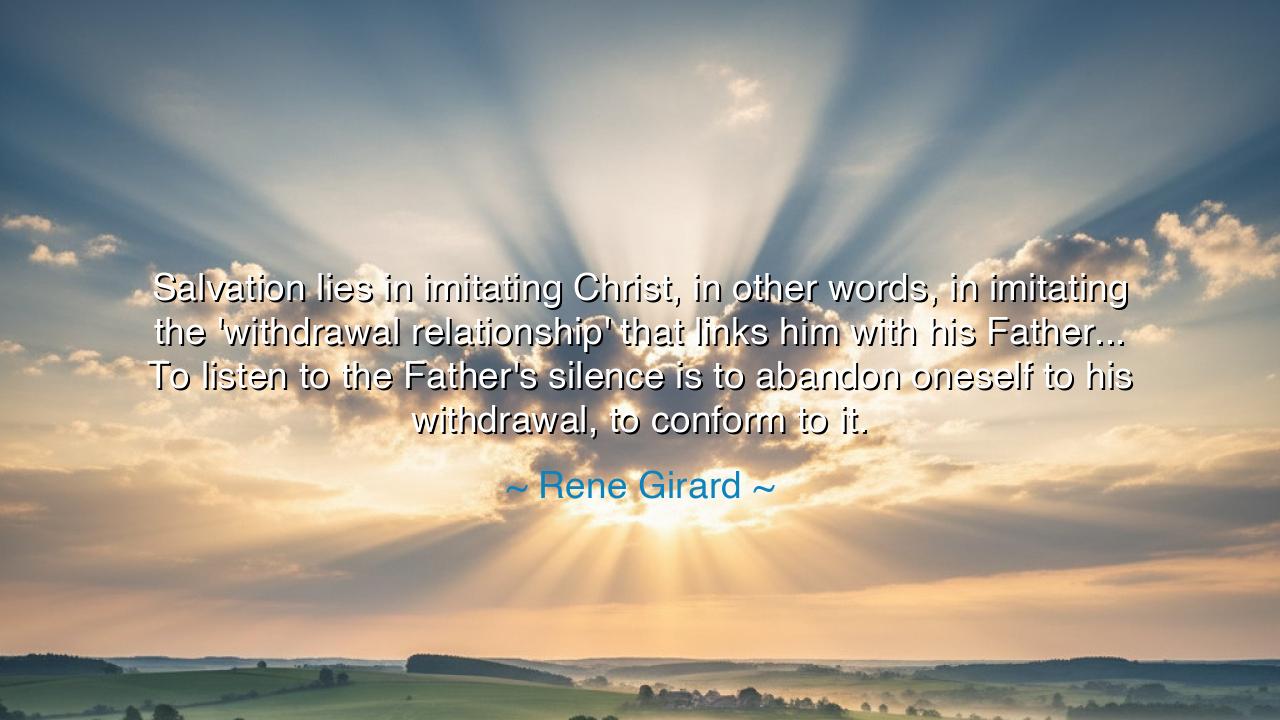
Salvation lies in imitating Christ, in other words, in imitating
Salvation lies in imitating Christ, in other words, in imitating the 'withdrawal relationship' that links him with his Father... To listen to the Father's silence is to abandon oneself to his withdrawal, to conform to it.






The philosopher of desire and sacrifice, René Girard, once declared: “Salvation lies in imitating Christ, in other words, in imitating the ‘withdrawal relationship’ that links him with his Father... To listen to the Father’s silence is to abandon oneself to his withdrawal, to conform to it.” In these words he draws us into a mystery both terrible and beautiful—that redemption is not in conquest or mastery, but in surrender, in mirroring the relationship of Christ to the Father, marked not by constant speech, but by silence, distance, and trust.
For the withdrawal of the Father is not absence, but the space in which faith is forged. It is the silence of the heavens that forces the heart to abandon its illusions of control, to yield itself utterly to the will beyond comprehension. Christ himself walked this path—crying out in Gethsemane, enduring the silence of the cross, and yet trusting even when no answer came. To imitate him, Girard teaches, is to embrace the same silence, to conform to the mystery of divine hiddenness.
This relationship of withdrawal shatters the arrogance of man, who seeks always to grasp, to define, to command. Instead, the disciple must learn to rest in unknowing, to accept the Father’s silence not as cruelty but as gift. For in this silence, pride dies, desire is purified, and the soul is stripped bare of all idols. It is here, in this dark surrender, that the likeness of Christ begins to shine forth in the believer.
The ancients, too, knew the sanctity of silence. The prophets waited in wilderness, the mystics fasted in solitude, the saints retreated to caves and deserts. Each learned that the voice of God often comes not in thunder but in stillness, and that to hear it, one must first be willing to be unmade by silence. So too does Girard remind us: salvation is not loud or triumphant at first, but humble, hidden, and forged in the Father’s withdrawal.
Therefore, let this wisdom endure: to imitate Christ is to embrace the silence of the Father, to conform not to our desires, but to His mystery. Though terrifying, this path is the way of transformation. For in the surrender of the self to divine withdrawal, one finds the deepest freedom—salvation not born of control, but of trust. And in that trust, the silence of the Father becomes the song of eternity.






NLdam ngoc linh
Girard’s view that listening to the Father's silence is part of salvation feels like an invitation to experience deeper stillness in our spiritual lives. But how do you balance this silence with the constant demands of life and the need to connect with others? Can silence truly lead to spiritual fulfillment, or does it require a deeper context?
ADKim anh Doan
I find Girard’s interpretation of Christ’s relationship with the Father fascinating. The idea of salvation coming from conforming to a ‘withdrawal relationship’ challenges the notion of salvation being about action or achievement. How do you interpret this idea—does it imply that by embracing silence and withdrawal, we align ourselves with a deeper truth or spiritual purpose?
TDLe Thi Dieu
Girard's idea of ‘withdrawing’ to connect with God through Christ's example raises an interesting point about spiritual practice. It’s as if true connection with the divine requires stepping back and embracing the silence. Do you think that this kind of withdrawal is necessary for spiritual growth, or is it something that might feel alienating in a fast-paced, modern world?
DKMach di kheng
Rene Girard’s perspective on salvation through imitating Christ’s withdrawal relationship with the Father is deeply thought-provoking. It suggests that silence and withdrawal can be a form of spiritual surrender. Do you think that in today’s world of constant noise and distraction, people can still find value in embracing silence and withdrawal as a way to connect with the divine?